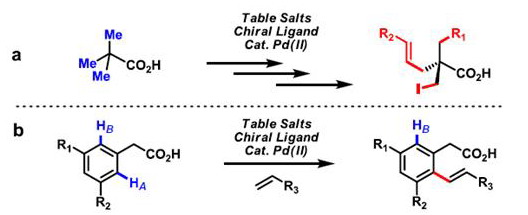求是理学论坛第12场―Prof. Jin-Quan Yu
题 目:Accelerated C–H Activation Reactions: Enantioselectivity and Positional Selectivity
报告人:Prof. Jin-Quan Yu,
单 位:Department of Chemistry, The Scripps Research Institute (美国斯克利普斯研究所)
时 间:2010年10月18号(周一)下午14:00
地 点:化学楼,教八-515
内容简介:
Pd(II)-catalyzed enantioselective and position-selective C–H activation reactions are developed using mono-N-protected chiral amino acid ligands. C–H activation intermediates are characterized, offering insights into the origin of the observed stereoselectivity. Moreover, these chiral ligands are found to accelerate drastically C–H activation reactions, shortening the reaction time from two days to 20 minutes.

References:
1) Shi, B.-F.; Maugel, N.; Zhang, Y.-H.; Yu, J.-Q. "PdII-Catalyzed Enantioselective Activation of sp2 and sp3 C−H Bonds Using mono Protected Amino Acids as Chiral Ligands" Angew. Chem. Int. Ed., 2008, 47, 4882.
2) Giri, R.; Shi, B.-F.; Engle, K. M.; Maugel, N.; Yu, J.-Q. "Transition Metal-Catalyzed C–H Activation Reactions: Diastereoselectivity and Enantioselectivity" Chem. Soc. Rev. 2009, 38, 3242.
3) Wang, D.-H.; Engle, K. M.; Shi, B.-F.; Yu, J.-Q. "Ligand-Enabled Reactivity and Selectivity in a Synthetically Versatile Aryl C–H Olefination" Science 2010, 327, 315.
4) Shi, B.-F.; Zhang, Y.-H.; Lam, J. K.; Wang, D.-H.; Yu, J-.Q. "Pd(II)-Catalyzed Enantioselective C–H Olefination of Diphenylacetic Acids." J. Am. Chem. Soc. 2010, 132, 460.
5) Lu, Y.; Wang, D.-H.; Engle, K. M.; Yu, J-.Q. "Pd(II)-Catalyzed Hydroxyl-Directed C–H Olefination Enabled by Monoprotected Amino Acid Ligands." J. Am. Chem. Soc. 2010, 132, 5916.
6) Engle, K. M.; Wang, D.-H.; Yu, J.-Q. "Constructing Multiply Substituted Arenes Using Sequential Pd(II)-Catalyzed C–H Olefination." Angew. Chem. Int. Ed. 2010, 49, 6169.
7) Engle, K. M.; Wang, D.-H.; Yu, J.-Q. "Ligand-Accelerated C–H Olefination Reactions: Evidence for a Switch of Mechanism." J. Am. Chem. Soc. 2010, 132, 14137.
报告人简介:
Prof. Jin-Quan Yu received his BSc in Chemistry from East China Normal University and his MSc from the Guangzhou Institute of Chemistry. In 2000, he obtained his PhD at the University of Cambridge with Prof. J. B. Spencer. Following time as a junior research fellow at Cambridge, he joined the laboratory of Prof. E. J. Corey at Harvard University as a postdoctoral fellow. He then began his independent career at Cambridge (2003–2004), before moving to Brandeis University (2004–2007), and finally to The Scripps Research Institute, where he was promoted to the associate professor (2007) and to Professor (2010). He has received numerous honors including CAPA Distinguished Faculty Award2009), Eli Lilly Award2008), Alfred P. Sloan Research Fellowship (2008), Amgen Young Investigator’s Award (2008), Journal Award for Synlett & Synthesis (2006), Camille and Henry Dreyfus New Faculty Award (2004), Royal Society University Research Fellowship (2003), Junior Research Fellowship of St John's College (1998). His group studies transition metal-catalyzed C–H activation.

